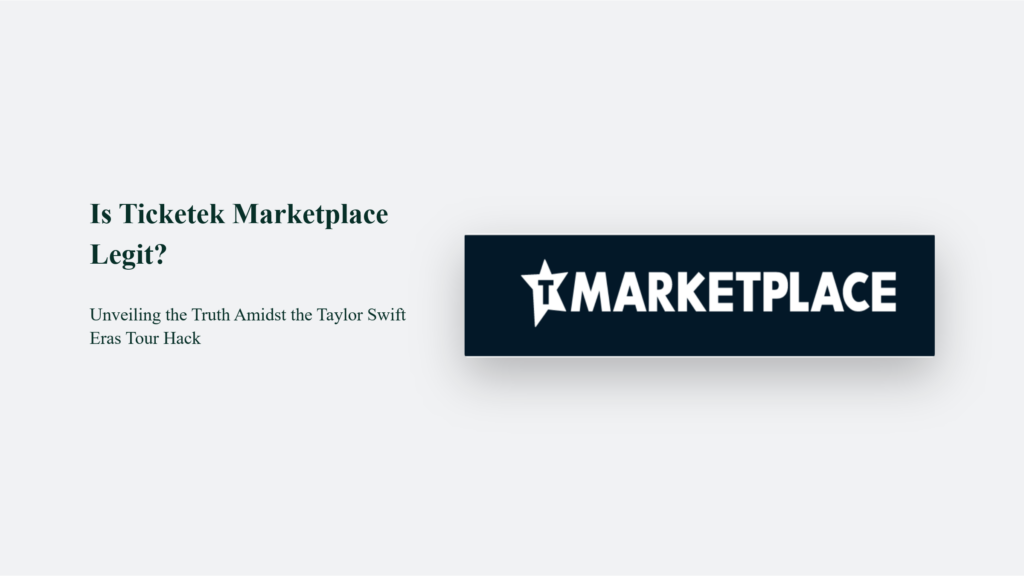In live events, the secondary ticket market is a double-edged sword. On one side, it provides a platform for fans to sell tickets they can no longer use, ensuring that seats don’t go empty. On the other, it’s a breeding ground for scalpers and scammers. The legitimacy of these platforms is often questioned, and Ticketek Marketplace is no exception, especially in light of recent events surrounding the Taylor Swift Eras Tour. So, is Ticketek Marketplace legit?

Key Takeaway: Is Ticketek Marketplace Legit?
The question of whether Ticketek Marketplace is legit is not black and white. While undeniable benefits and protections are in place, the platform has flaws, particularly concerning operational transparency and protection against scammers. Users should proceed cautiously, armed with the knowledge of the potential risks and safeguards.
The Controversy Surrounding Ticketek Marketplace
Ticketek Marketplace, an extension of the well-known Ticketek platform, operates under the guise of a legitimate secondary ticket market. It promises fairness, transparency, and security to both buyers and sellers. Geoff Jones, CEO of TEG (the company behind Ticketek), emphasizes the platform’s commitment to protecting fans and ensuring the integrity of ticket transactions. However, the legitimacy of Ticketek Marketplace has been under scrutiny for various reasons.
Skepticism and Scrutiny
Critics argue that the lack of buyer protection and clear policies around refunds, resales, or guarantees poses a significant risk. Buyers are left with little to no recourse if a purchase doesn’t go smoothly or a fake listing is encountered. This lack of policy and potential for unfairness has led some to view Ticketek Marketplace with suspicion, akin to “legalized” ticket scalping.
A Haven for Scammers?
The excitement surrounding Taylor Swift’s Eras Tour has been palpable, with fans eagerly scrambling to secure their spots at one of pop music’s most anticipated events. However, this frenzy has also ushered in a less welcome phenomenon: a significant uptick in ticket-related scams, particularly through social media platforms. The recent hack during the Taylor Swift Eras Tour has exposed a darker aspect of secondary ticket sales, highlighting the vulnerabilities and risks of purchasing resale tickets.
The Rise of Social Media Scams
Scammers have exploited the buzz around the Taylor Swift Eras Tour by compromising social media accounts to sell fake tickets. These fraudsters hack into genuine accounts and offer non-existent tickets for sale, targeting fans desperate to attend the concert.
The Australian Competition and Consumer Commission (ACCC) has reported a worrying spike in these scams, with over 273 Australians falling victim and collectively losing more than $135,000. Most of these reports and losses have come from New South Wales and Victoria, highlighting a significant problem in areas where Swift is scheduled to perform.

The Impact of Scams on Fans
The impact of these scams extends beyond financial losses. For many fans, attending a Taylor Swift concert is a dream come true, and the emotional toll of being scammed can be devastating. Young fans, in particular, who may have saved up for months to buy a ticket, find themselves not only out of pocket but also facing the heartbreak of missing out on a once-in-a-lifetime experience.
The Role of Ticketek Marketplace
In response to the growing concern over ticket scams, the ACCC has recommended Ticketek Marketplace as a safer alternative for purchasing resale tickets. Ticketek Marketplace is promoted as a secure and ethical platform offering consumer-led, price-capped, and ethical ticket exchange services. It guarantees the validity of all sale transactions and employs a secure payment process to protect both buyers and sellers from fraud.
However, despite these measures, scammers on social media and other unofficial platforms continue to pose a risk to unsuspecting fans. The legitimacy and safety of purchasing resale tickets, even from platforms that claim to offer protection, are under scrutiny.
Navigating the Secondary Ticket Market Safely
Fans looking to purchase resale tickets to the Taylor Swift Eras Tour or any other event should exercise caution and due diligence. It’s advisable to purchase tickets only from authorized resellers and be sceptical of offers that seem too good to be true, especially those on social media. Verifying the seller’s authenticity, checking reviews, and using secure payment methods can also help mitigate the risk of falling victim to a scam.
Operational Challenges
Furthermore, operational issues have tarnished the platform’s reputation. Fans have reported Ticketek Marketplace being inaccessible for weeks, with no communication from the company regarding the outage. This lack of transparency and customer support has left many in the lurch, especially those trying to sell their Taylor Swift tickets through the only “approved” method, as Ticketek bans private sales.
The Case for Ticketek Marketplace’s Legitimacy
Despite these criticisms, several aspects of Ticketek Marketplace argue in favour of its legitimacy:
- Consumer Protection: The platform caps resale prices at 10% above face value and cancels the original barcodes upon purchase, ensuring ticket validity.
- Compliance and Legislation: It operates within legal frameworks, adding an extra layer of security for users.
- Seller Guarantees: Sellers are not charged fees, encouraging a transparent marketplace.
- Secure Payment Process: Various payment methods are accepted, protecting transactions from fraud.
- Customer Support: A dedicated help centre and direct contact form are available for user assistance.
The Bottom Line:
In the dynamic world of ticket resale, the line between legitimacy and exploitation can be thin. As platforms like Ticketek Marketplace evolve, so must the measures to protect fans and ensure a fair, transparent, and secure ticket-buying experience.
Frequently Asked Questions:
Can I trust tickets bought on Ticketek Marketplace?
While Ticketek Marketplace takes steps to ensure the validity of tickets, recent events suggest buyers should remain vigilant and consider the platform’s security features and buyer protection policies.
What should I do if I encounter a scam?
Report the scam to the authorities, including the ACCC, and contact Ticketek Marketplace’s customer support for assistance.
Are there fees for selling tickets on Ticketek Marketplace?
No, sellers are not charged any fees for listing and selling tickets on the platform, fostering a fair and transparent market.




